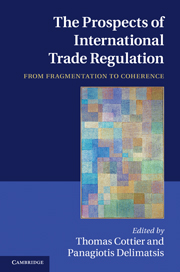Book contents
- Frontmatter
- Contents
- List of figures
- List of tables
- Contributors
- Preface and acknowledgements
- Table of cases
- List of abbreviations
- Introduction: fragmentation and coherence in international trade regulation: analysis and conceptual foundations
- PART I Constitutional issues in international trade regulation
- 1 The constitutionalisation of international trade law
- 2 Reflections on modes of decision-making in the World Trade Organization
- 3 Regionalism: moving from fragmentation towards coherence
- PART II Reforming specific areas of trade regulation
- PART III ‘Trade and…’ linkages
- Index
- References
1 - The constitutionalisation of international trade law
from PART I - Constitutional issues in international trade regulation
Published online by Cambridge University Press: 26 April 2011
- Frontmatter
- Contents
- List of figures
- List of tables
- Contributors
- Preface and acknowledgements
- Table of cases
- List of abbreviations
- Introduction: fragmentation and coherence in international trade regulation: analysis and conceptual foundations
- PART I Constitutional issues in international trade regulation
- 1 The constitutionalisation of international trade law
- 2 Reflections on modes of decision-making in the World Trade Organization
- 3 Regionalism: moving from fragmentation towards coherence
- PART II Reforming specific areas of trade regulation
- PART III ‘Trade and…’ linkages
- Index
- References
Summary
KEY MESSAGES
∙ Empirical research lends support to the idea of a ‘multi-speed globe’ of differentiated (fragmented) constitutionalisation, rather than a fully-fledged integrative constitutional process. ‘Variable geometry’ on the global scale could acknowledge irreconcilable differences between nation states.
∙ A prominent candidate for one fragment of this variable global constitutionalisation is the World Trade Organization (WTO). Constitutionalisation of the WTO means an evolution from constitution to constitutionalism within this organisation.
∙ A core constitutional issue is the public interest. The concept of ‘public interest’ can be used in various ways. Exception and limitation clauses play an important role in the constitutionalist reconstruction of international law.
∙ The WTO is so far only modestly constitutionalised, but could and should be further constitutionalised. Further constitutionalisation of the WTO should comprise the following reforms: upgrading non-trade concerns such as the environment in the treaty language itself, liberalisation in trade sectors in which poor countries can compete, empowerment of individuals by enabling at least indirect participation in secondary law-making (parliamentary dimension) and dispute settlement (direct effect), streamlining of the decision-making and law-making processes by reviving the legally available options for majority voting and judicial review of WTO acts.
Introduction
Over the past sixty years, international law has developed from a narrow system of inter-state norms of coexistence into a broader and organised system of cooperation. One of the most essential developments has been the growing number of multilateral treaties designed not only to set in place legal frameworks but also to promote cooperation in an interdependent world.
- Type
- Chapter
- Information
- The Prospects of International Trade RegulationFrom Fragmentation to Coherence, pp. 69 - 102Publisher: Cambridge University PressPrint publication year: 2011
References
- 10
- Cited by



